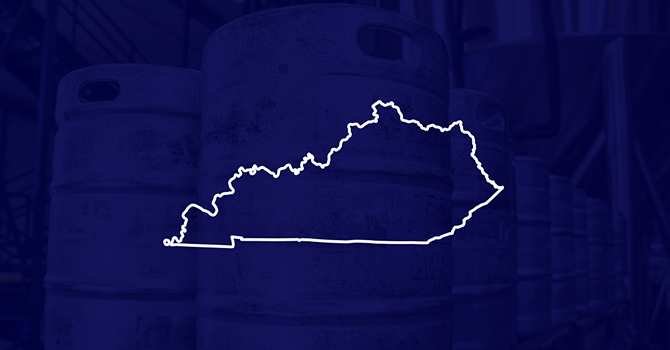
Some Kentucky craft brewers will soon be able to distribute their own products and terminate wholesaler contracts more easily after Gov. Andy Beshear signed Senate Bill 15 into law on March 18.
The new law will allow breweries producing fewer than 50,000 barrels of beer annually to self-distribute up to 2,500 barrels per year.
“I think for a lot of my members, this makes a lot of sense,” Kentucky Guild of Brewers executive director Derek Selznick told Brewbound. “The majority of my members produce less than 500 barrels of beer per year, and pretty much, it’s all taproom sales, a couple of festivals here and there, and then maybe a couple of restaurants that are going to be close to them.”
All 91 breweries operating in Kentucky have annual production below the 50,000-barrel cap. The only producer in the state with an active brewer’s license with an annual output larger than the cap is spirits giant Brown-Forman, which sells a line of flavored malt beverages under its Jack Daniel’s brand. Production of Jack Daniel’s Country Cocktails will shift to Pabst Brewing Company beginning April 1 under a contract the companies announced in December 2020.
Selznick, channeling The Office’s Michael Scott, described self-distribution as a “win-win-win” for all members of the three-tier system in Kentucky.
“It’s a win for our breweries that they will be able to provide that great customer service and sell their beer directly to their retail partners,” he said. “It’s going to be actually a win for our wholesale partners, who can can stop working with some of our smaller brands that it’s harder for them to give it the real attention it deserves, especially when they have these huge portfolios.
“Everyday it seems we’re adding more SKUs, and so this allows our small members to really do that,” Selznick continued. “And for retailers and consumers, now that breweries are able to just directly take beer to them. We’re going to see a lot more of what were taproom exclusives end up at retail partners, which is going to give consumers more choice out in the market.”
Selznick expects the law to go into effect in late June or early July, a date that by statute is set by the state’s attorney general.
In addition to self-distribution privileges, the bill updated franchise law in the state for the first time since 2004, when only three microbreweries existed in the state, Selznick said.
“What this did was gave a little bit more equality for breweries,” he said. “Under the current law, a wholesaler, for whatever reason, could drop a brand sight unseen.”
After the new law goes into effect, breweries making fewer than 50,000 barrels annually that account for fewer than 5% of a wholesaler’s gross sales will be able to terminate that relationship after giving 45 days’ notice and buying back their brand rights. If the brewery and wholesaler cannot agree on the fair market value of those rights after 30 days, a third-party arbitrator steps in.
According to the law, arbitration must be administered by commercial arbitration rules set by the American Arbitration Association and should not last longer than 45 days after the first notice of intent to arbitrate is exchanged between the parties.
If the parties enter arbitration, the brewer and the wholesaler must split the cost of the arbiter’s fees, and the arbitration must take place in a city closest to the distributor with a population of 20,000 or more, which amounts to fewer than 20 cities in the state. The arbitrator must render a decision within 30 days, unless both parties agree to extend that deadline.
“The decision of the arbitration is final and binding on the parties,” the law reads. “Under no circumstances may the parties appeal the decision of the arbitrator.”
In January, Massachusetts enacted franchise law reform that allows breweries making fewer than 250,000 barrels per year to terminate wholesaler relationships by providing 30 days’ notice and paying fair market value for brand rights.
Holliston, Massachusetts-based Atlantic Beverage Distributors is challenging that law’s constitutionality as it disputes an attempted termination by Framingham, Massachusetts-based Jack’s Abby Craft Lagers. Atlantic is arguing that fair market value should be determined by a jury and subject to review by a court, rather than arbitration.
Kentucky’s craft breweries produced 130,940 barrels and generated $872 million in economic impact in 2019, the most recent year for which data is available from national not-for-profit trade group the Brewers Association.